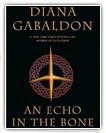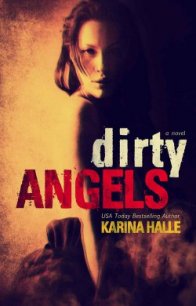Outlander aka Cross Stitch - Gabaldon Diana (библиотека электронных книг txt) 📗
The first few stabs were uneventful, though it took several tries to get through the bull-hide. It was tougher than it looked. So is the skin on a man’s belly, I was informed. On the next try, I tried a direct overhand strike, and hit one of the wood pieces.
I thought for a moment that my arm had suddenly fallen off. The shock of impact reverberated all the way to my shoulder, and the dirk dropped from my nerveless fingers. Everything below the elbow was numb, but an ominous tingling warned me that it wouldn’t be for long.
“Jesus H. Roosevelt Christ,” I said. I stood gripping my elbow and listening to the general hilarity. Finally Jamie took me by the shoulder and massaged some feeling back into the arm, pressing the tendon at the back of the elbow, and digging his thumb into the hollow at the base of my wrist.
“All right,” I said through my teeth, gingerly flexing my tingling right hand. “What do you do when you hit a bone and lose your knife? Is there a standard operating procedure for that?”
“Oh, aye,” said Rupert, grinning. “Draw your pistol wi’ the left hand and shoot the bastard dead.” This resulted in more howls of laughter, which I ignored.
“All right,” I said, more or less calmly. I gestured at the long claw-handled pistol Jamie wore on his left hip. “Are you going to show me how to load and shoot that, then?”
“I am not.” He was firm.
I bristled a bit at this. “Why not?”
“Because you’re a woman, Sassenach.”
I felt my face flush at this. “Oh?” I said sarcastically. “You think women aren’t bright enough to understand the workings of a gun?”
He looked levelly at me, mouth twisting a bit as he thought over various replies.
“I’ve a mind to let ye try it,” he said at last. “It would serve ye right.”
Rupert clicked his tongue in annoyance at us both. “Dinna be daft, Jamie. As for you, lass,” turning to me, “it’s not that women are stupid, though sure enough some o’ ’em are; it’s that they’re small.”
“Eh?” I gaped stupidly at him for a moment. Jamie snorted and drew the pistol from its loop. Seen up close, it was enormous; a full eighteen inches of silvered weapon measured from stock to muzzle.
“Look,” he said, holding it in front of me. “Ye hold it here, ye brace it on your forearm, and ye sight along here. And when ye pull the trigger, it kicks like a mule. I’m near a foot taller than you, four stone heavier, and I know what I’m doin’. It gives me a wicked bruise when I fire it; it might knock you flat on your back, if it didna catch ye in the face.” He twirled the pistol and slid it back into its loop.
“I’d let ye see for yourself,” he said, raising one eyebrow, “but I like ye better wi’ all of your teeth. You’ve a nice smile, Sassenach, even if ye are a bit feisty.”
Slightly chastened by this episode, I accepted without argument the men’s judgment that even the lighter smallsword was too heavy for me to wield efficiently. The tiny sgian dhu, the sock dagger, was deemed acceptable, and I was provided with one of those, a wicked-looking, needle-sharp piece of black iron about three inches long, with a short hilt. I practiced drawing it from its place of concealment over and over while the men watched critically, until I could sweep up my skirt, grab the knife from its place and come up in the proper crouch all in one smooth move, ending up with the knife held underhand, ready to slash across an adversary’s throat.
Finally I was passed as a novice knife-wielder, and allowed to sit down to dinner, amid general congratulations – with one exception. Murtagh shook his head dubiously.
“I still say the only good weapon for a woman is poison.”
“Perhaps,” replied Dougal, “but it has its deficiencies in face-to-face combat.”
Chapter 19. THE WATERHORSE
We camped the next night on the banks above Loch Ness. It gave me an odd feeling to see the place again; so little had changed. Or would change, I should say. The larches and alders were a deeper green, because it was now midsummer, not late spring. The flowers had changed from the fragile pinks and whites of May blossom and violets to the warmer golds and yellows of gorse and broom. The sky above was a deeper blue, but the surface of the loch was the same; a flat blue-black that caught the reflections from the bank above and held them trapped, colors muted under smoked glass.
There were even a few sailboats visible, far up the loch. Though when one drew near, I saw it was a coracle, a rough half-shell of tanned leather on a frame, not the sleek wooden shape I was used to.
The same pungent scent that pervades all watercourses was there; a sharp mix of tangy greenness and rotted leaf, fresh water, dead fish, and warm mud. Above all, there was that same feeling of lurking strangeness about the place. The men as well as the horses seemed to feel it, and the air of the camp was subdued.
Having found a comfortable place for my own bedroll and Jamie’s, I wandered down to the edge of the loch to wash my face and hands before supper.
The bank sloped sharply down until it broke in a jumble of large rock slabs that formed a sort of irregular jetty. It was very peaceful under the bank, out of sight and sound of the camp, and I sat down beneath a tree to enjoy a moment’s privacy. Since my hasty marriage to Jamie, I was no longer followed every moment; that much had been accomplished.
I was idly plucking the clusters of winged seeds from a low-hanging branch and tossing them out into the loch when I noticed the tiny waves against the rocks growing stronger, as though pushed by an oncoming wind.
A great flat head broke the surface not ten feet away. I could see the water purling away from keeled scales that ran in a crest down the sinuous neck. The water was agitated for some considerable distance, and I caught a glimpse here and there of dark and massive movement beneath the surface of the loch, though the head itself stayed relatively still.
I stood quite still myself. Oddly enough, I was not really afraid. I felt some faint kinship with it, a creature further from its own time than I, the flat eyes old as its ancient Eocene seas, eyes grown dim in the murky depths of its shrunken refuge. And there was a sense of familiarity mingled with its unreality. The sleek skin was a smooth, deep blue, with a vivid slash of green shining with brilliant iridescence beneath the jaw. And the strange, pupilless eyes were a deep and glowing amber. So very beautiful.
And so very different from the smaller, mud-colored replica I remembered, adorning the fifth-floor diorama in the British Museum. But the shape was unmistakable. The colors of living things begin to fade with the last breath, and the soft, springy skin and supple muscle rot within weeks. But the bones sometimes remain, faithful echoes of the shape, to bear some last faint witness to the glory of what was.
Valved nostrils opened suddenly with a startling hiss of breath; a moment of suspended motion, and the creature sank again, a churning roil of waters the only testimony to its passage.
I had risen to my feet when it appeared. And unconsciously I must have moved closer in order to watch it, for I found myself standing on one of the rock slabs that jutted out into the water, watching the dying waves fall back into the smoothness of the loch.
I stood there for a moment, looking out across the fathomless loch. “Goodbye,” I said at last to the empty water. I shook myself and turned back to the bank.
A man was standing at the top of the slope. I was startled at first, then recognized him as one of the drovers from our party. His name was Peter, I recalled, and the bucket in his hand gave the reason for his presence. I was about to ask him whether he had seen the beast, but the expression on his face as I drew near was more than sufficient answer. His face was paler than the daisies at his feet, and tiny droplets of sweat trickled down into his beard. His eyes showed white all around like those of a terrified horse, and his hand shook so that the bucket bumped against his leg.



